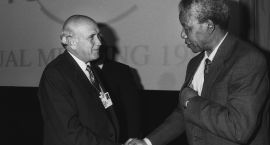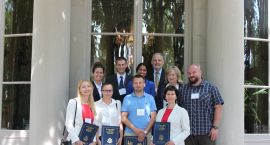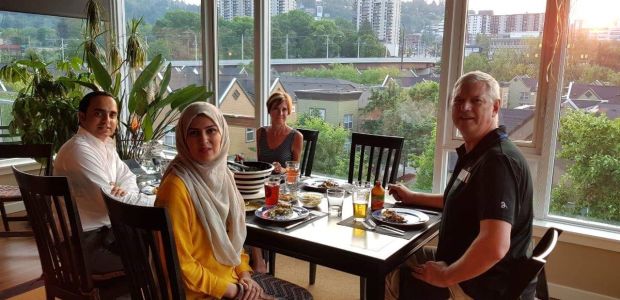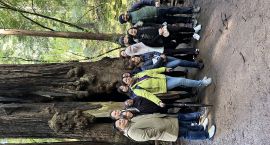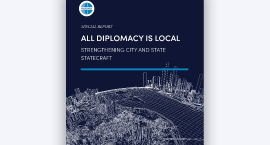In July 2018, Ms. Sadaf Usman, Director of For a Cause, participated in the International Visitor Leadership Program project for Pakistan: “Strengthening Civil Society- Building Community Resilience Against Violent Extremism'”. She and her colleagues visited Washington, DC; Baltimore, MD; Pittsburgh, PA; Portland, OR; Kalamazoo, MI; and Detroit, MI to connect with organizations working to prevent and counter violence through community-focused programs. Below she reflects on her experience.
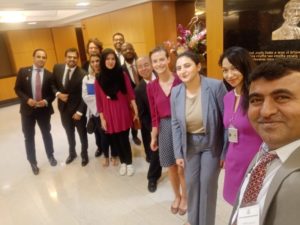
As part of the IVLP on “Strengthening Civil Society- Building Community Resilience against Violent Extremism,” I found the 3-week experience to be quite enlightening and educational. The rise of conflict based on race, colour, religion and ethnicity was extensively covered in the program, giving us a comprehensive vision of the issue. The discussions with the government and non-government agencies helped us delve into the deeper roots of the problem. We made some important findings during the course of the program, one of them being the need for a strong base in the foundation of any society, i.e. family and what role it plays in shaping us as human beings. People who have a disturbed childhood are more likely to fall into violence and extremism. In addition, we learned about some great work on breaking stereotypes related to Muslims and Islam.
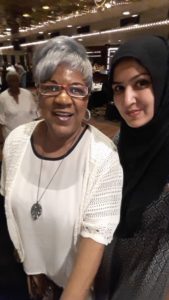
Our personal interactions during home hospitality and general interaction with the common public helped bridge gaps on both sides. It enabled us to connect as citizens of the world, beyond our race, gender, class, and nationality. Home hospitality was one of the purest and warmest experiences that we had. Meeting Americans beyond the realm of political or ideological divides and just as human beings made me realize how similar we all are and how similar our concepts of happiness, sacrifice, pain and humour can be. The hospitality extended to us was exceptional and the friendships made during those visits were most special and memorable.
I was quite interested to see the efforts on the part of the government at federal, state and local levels to take the community into confidence about activities and programs being introduced by the government and saw how it makes them all the more effective and strong, having won the support of the community as well.
In Pakistan, unfortunately, there is a long history of lack of trust between the public and the government. Even the government’s effort, if any, to bring the community on board, is eyed with doubt and skepticism.
This program opened doors of possibilities for me as it gave me the vision to expand the impact of my work by reaching out for government support in my cause, a possibility I hadn’t considered before and that can help me reach out to a wider audience.
I was also inspired by the work of the community organisations, operating at both the local and international level to bring about positive change. Since behaviour change is a complex subject, success can be a challenge in this field. However, the faith and optimism of these non-profits is what issues like countering violent extremism need. Even if one life, one mind starts to think differently, starts to walk the path of peace, it can do wonders. This attitude gave me renewed faith in my work on life skills, self-empowerment and positivity and has encouraged me to learn more about the issues in my own community and come up with creative ways to approach them.
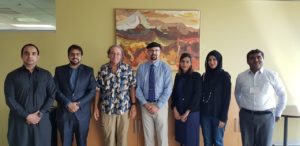
The importance of counselling, mediation and efforts for de-escalation cannot be undervalued, and examples of these have become a strong rationale for working from this angle back home, too. In this regard, one of the most effective tools was engaging those who used to be part of the problem to become part of the solution by speaking about their own experience as violent extremists and its effects on their lives.
The culture of volunteering in the U.S. is most inspiring. From youth to adults, students to professionals, everyone seems to be engaged in some sort of community service, which is not only good for the community but also for the individual himself. I hope to share these inspirational stories with my people back home to promote the culture of volunteering in Pakistan as well.
The agenda used by extremist entities appeals to young, impressionable minds. They sell what sells, like the ideas of courage, sacrifice, glory, and nobility. The counter narrative has to be equally strong, spoken in the same language that is understood. The way forward is not to block such avenues that promote extremist agendas as their growth cannot be curtailed, but to resist it by using the same media that are being used to promote it.
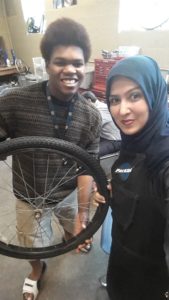
The IVLP program brought to the table some difficult realities – such as gun control, a sense of injustice amongst many countries around the world, the drug mafia, and vicious cycles of deprivation faced by some segments of society, who, to this day, feel unhealed – and how these issues are linked with violent extremism.
The program also gave me an opportunity to present the true face of Islam, a religion that begins with the greeting of peace. It is the distorted interpretation of Islam that is used by extremist entities to fulfill their hidden agendas. Islam is truly a religion of peace and tolerance, so I sincerely hope our exchange helped in changing negative perceptions about Islam and Muslims.
I remember being told at one of the sessions that, “In the U.S., people have expectations from the government, and they have expectations from themselves!” This strong statement reawakened my duty towards my own country to hold my government accountable, too. I have come back with a strong will to make positive contributions to my society. As Mr. Carlos Aranaga from the State Department said, “We don’t want our gesture to be returned, we want it to be passed on!” I look forward to passing on what I learned during my IVLP for a more peaceful and tolerant world.
The International Visitor Leadership Program is sponsored by the U.S. Department of State with funding provided by the U.S. Government and supported in its implementation by Meridian International Center.









